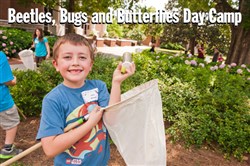VOL. 37 | NO. 5 | Friday, February 1, 2013
School-based camps: From crime scenes to stolen bases
By Brad Schmitt

A camper at Belmont University’s Beetles, Bugs and Butterflies camp last year.
-- Photo Courtesy Of Belmont UniversityRemember when summer camp meant swimming, softball and a few wienie roasts ’round the fire? The times, they are a changin’.
The trend for area universities and private schools is to offer super-specialty camps for just a few days at a time. And the more modern or unusual, the better.
Each summer, Nashville-area children can build websites, Chinese kites or robots, solve grisly murders and put the suspects on trial. They can go on bug hunts, create and launch rockets, sing, dance, play football, lacrosse, and basketball or debate each other until they’re blue in the face. Oh yeah, and snacks are included.
The Tennessee State University criminology department wanted to generate a little income and attention. So last summer, the faculty launched a CSI/Mock Trial camp.
Students process a mock murder scene for two days, then hold a trial for the suspect for the next three days. Campers’ parents and college students sit as jurors.
“I’ve never seen teens so well behaved,” TSU criminology professor Deborah Burris-Kitchen says, “because they were so into it.”
‘Productive recruitment tool’
Universities and private schools have more self-serving reasons to offer the camps, the chief among them, the chance to recruit students and student-athletes – and student musicians.
“High school students come to Belmont sampling the university for a week, and then returning to audition,” Belmont bands director Barry Kraus says. “So we’ve seen it as a productive recruitment tool.”
Brad Gioia, headmaster at Montgomery Bell Academy, says simply: “We look at it as a great admissions/PR tool.”
In addition to recruitment, officials say schools use summer camps to:
- Supplement pay for faculty and coaches
- Keep facilities functioning better by running them for 12 months a year
- Let student athletes make some money and get experience coaching
n Develop fans who might return to campus for the schools’ athletics and music programs
Make money
Some school officials insist that campers’ fees – which range from $65 for some day camps to more than $500 for some overnight camps – barely cover expenses, and that they make little money.
“Obviously, they’re lying,” says Lori Alexander, who runs Vanderbilt’s sports camps. “But we’re not doing it to get rich.”
Build the fan base
Alexander says Vanderbilt’s sports camps are most effective in letting coaches look at local talent. And she says the university hopes to add to the next generation of Vandy sports fans.
“We get a lot of people who come on campus who haven’t been on campus,” Alexander adds. “And they may want to come back for a game or even to come to school here.”
And that works. Some schools, like Belmont, even give campers a free ticket to a game, but parents say there are other reasons their kids want to go back to campus to see games.
Heather Middleton, a corporate communications executive, says her 6-year-old son, Carter, wanted to see the Commodores play basketball because some of the players had coached him last summer at a Vandy basketball camp.
“He recognized the coaches and players, so it was fun for him,” Middleton explains.
The numbers are big and getting bigger: Vanderbilt’s sports camps alone drew about 4,000 campers to campus last summer.
Belmont’s summer music camps drew about 1,000 students, about half from out of state.
Montgomery Bell Academy will offer more than 100 camps this summer.
So yes, the schools make some money and recruit students, faculty and students earn extra bucks and the facilities run for 12 months. But there’s another benefit that the mom, Middleton, really appreciates about her son’s time at summer camp.
“He learned a lot,” she says.
Of robots, bugs and memories
Lipscomb University has long offered camps in robotics, but this summer kids as young as 6 can participate.
“I’ve gotten advice like, we can’t do anything for longer than 10 minutes or the kids’ll get bored,” says Greg Nordstrom, electrical and computer engineering professor who has run robotics camps for the older kids for years.
Nordstrom says he plans to keep it simple. One activity involves putting strings through five bendy straws and moving them like fingers.
“Then your robot hand is waving at you!” Nordstrom enthuses.
And Belmont has been offering bug hunts in its Beetles, Bugs & Butterflies camps for more than 20 years.
“The first year, we did a bugs and plants camp, and it started out well, with children of faculty and staff,” biology professor Steve Murphree says.
It grew and grew, and now hundreds of kids sign up for at least three camps each summer, waiting anxiously to get their bug collection kits. And the professor gets as much out of it as the students.
“This one kid had autism, he was very quiet, but really, you could tell he was absorbing it,” Murphree says. “He’s one I did allow to come back in later years and help with collecting trips.
“I still have in my office a little clay praying mantis that he made and gave to me.”